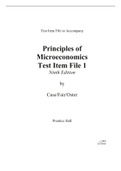Exam (elaborations)
Test Item File to Accompany Principles of Microeconomics Test Item File 1 Ninth Edition by Case/Fair/Oster Prentice Hall
- Course
- Institution
Test Item File to Accompany Principles of Microeconomics Test Item File 1 Ninth Edition by Case/Fair/Oster Prentice Hall
[Show more]




